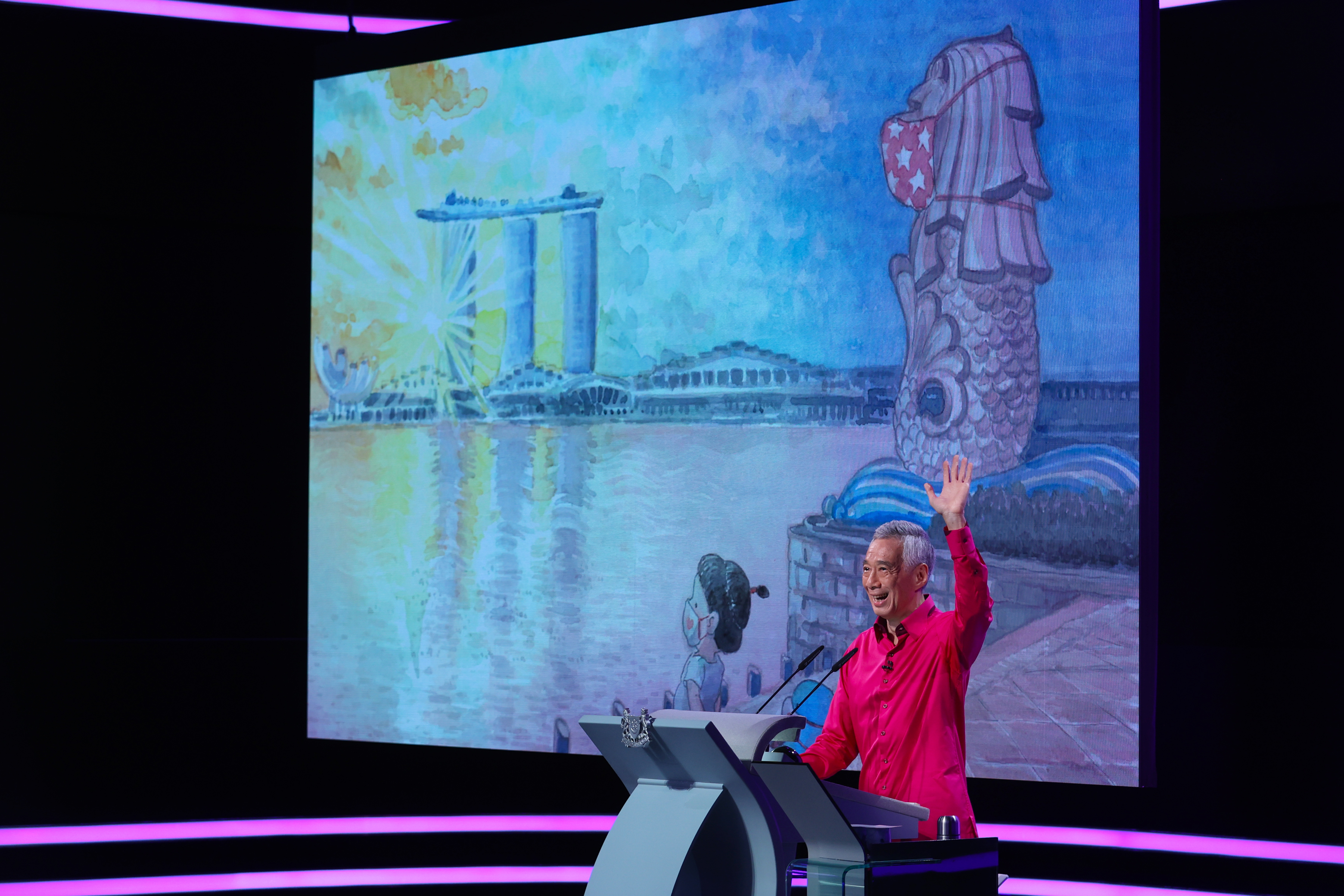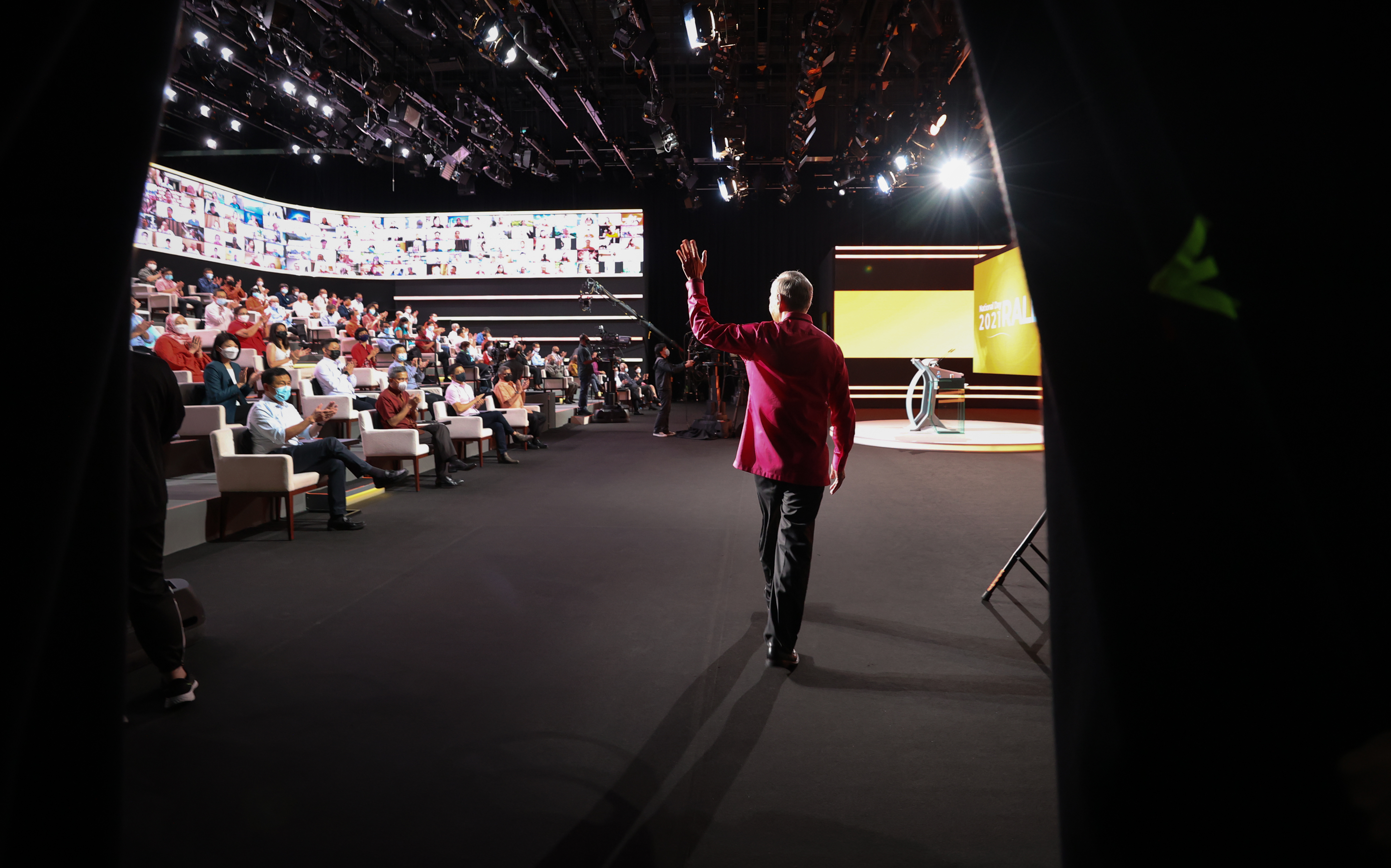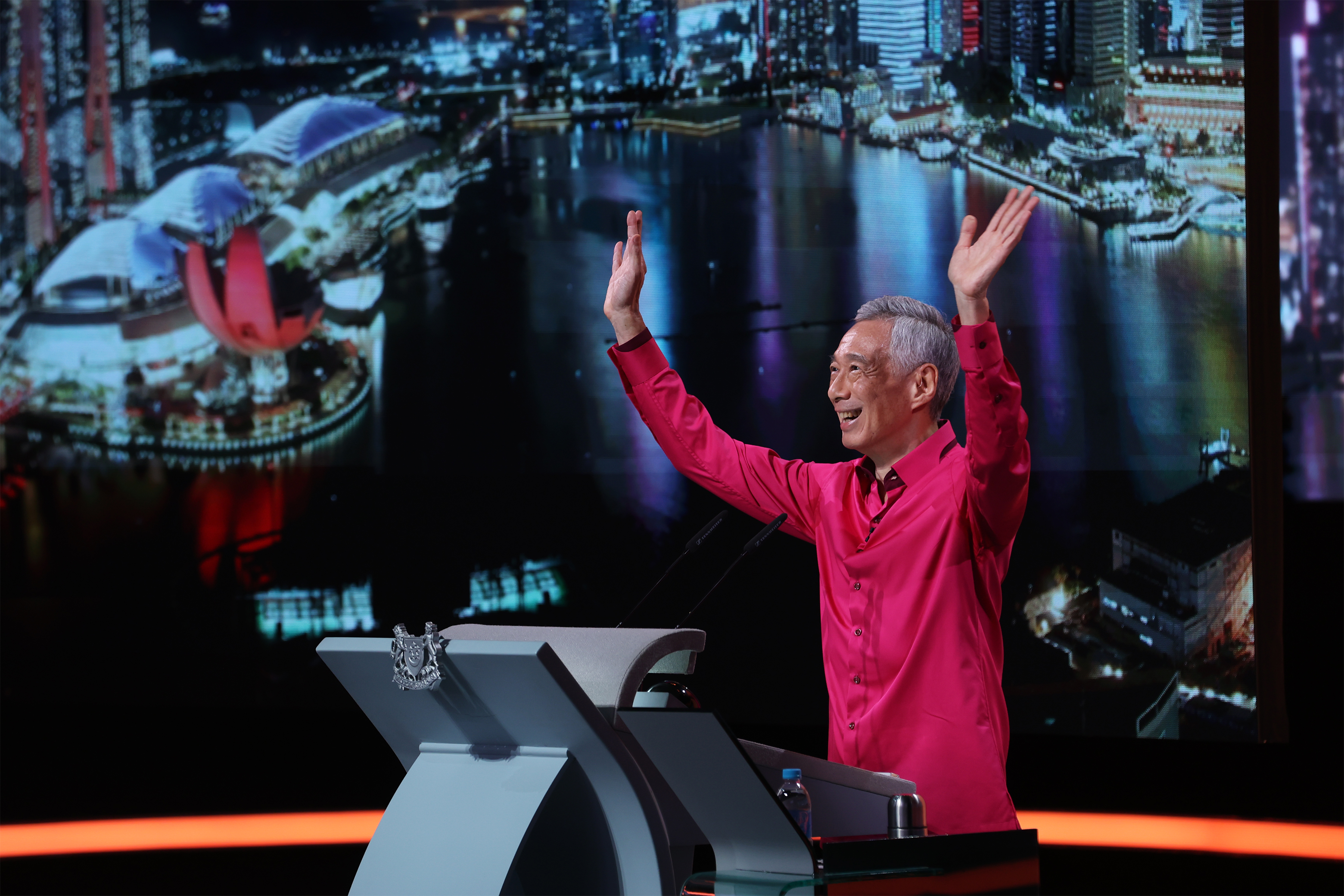Same, same but different.
This year’s National Day Rally feels different in terms of location and format.
NDR was held for the first time at Mediacorp on August 29, taking on a hybrid format. Mediacorp hosted a studio audience of close to 100, while about 1,800 people joined the NDR via Zoom.
https://www.instagram.com/p/CTKTm60hN5Q/
But the substance continues to be the same, in terms of how PM used the NDR occasion to, in the words of Lee Kuan Yew, "take stock of what we have achieved or failed to achieve in the past year, and define and chart out the course that we must take in the year ahead".
This year, PM Lee had to do a "two-year stock take" on the state of Singapore and Singaporeans.
As he reminded the audience, his last National Day Rally was two years ago. Much has changed since then, especially due to the impact of Covid-19.
Covid-19 “has sharpened fault lines in our society, and made some difficult issues more urgent”, he said.
Although PM’s speech this year was not heavy on policy details, it was a serious one, focusing on three main issues: supporting the low-wage workers (LWW), foreign employees, and race and religion.
All three are closely linked to the effects of globalisation in Singapore.
Help for lower-wage workers (LWW)
LWWs have been hard hit by the economic impact of Covid-19, especially those in the gig economy.
The proliferation of "super apps" and the fact that more multinational corporations such as Grab, Deliveroo, and Foodpanda, are sinking their roots in Singapore mean that there's always a demand for delivery workers.
 Photo by Ministry of Information and Communications.
Photo by Ministry of Information and Communications.
While more jobs are being created, the lure of keeping costs low is something that ranks top in many companies' minds.
This, in turn, results in delivery riders feeling that they are "disposable".
It is, therefore, heartening to hear from PM Lee that more will be done for LWWs, including raising the payouts for Workfare Income Supplement recipients.
NTUC Sec-Gen Ng Chee Meng urged platform operators to work together with NTUC to improve work terms and conditions, work safety as well as medical and injury coverage for these employee-like gig workers.
At the tripartite level, Ng said that NTUC is also exploring how it can provide better support for them.
Workers' Party (WP) MP Louis Chua was also similarly concerned about the plight of workers in the gig economy.Chua urged more to be done to protect their interests and provide a safety net for this group during the Committee of Supply debates this year.
Having more safeguards for LWWs, however, would require a mindset shift among Singaporeans.The implication is that as consumers, Singaporeans will have to chip in and start paying more, so that we can help cover the costs of lifting the LWW’s wages.
Foreign employees
It's not just LWWs who are facing the heat. Middle-income Singaporeans have also been facing job anxiety, particularly on account of foreign work pass holders, said PM Lee.
Given these anxieties, there's a hope that government policies pertaining to foreign workers can be refined, and gaps pertaining to discrimination can be addressed.
Previously, labour MP Patrick Tay had highlighted the issue of workplace discrimination, saying that they "are looking at two areas where PMEs seem more affected with – nationality and age".
While PM mentioned that work pass holders are here to complement the workforce, attract more investments and subsequently grow the economy, he was also quick to address the anxieties of the local workforce.To ensure that the foreigners who compete for jobs here are of the right standard, Singapore will tighten the criteria for Employment Pass and S Pass holders by raising salary cut-offs, he said.
The Government will also give the Tripartite Alliance for Fair and Progressive Employment Practices (Tafep) more teeth by putting its guidelines into law — a move that is expected to further ease anxieties.
In addition, a tribunal will be created to deal with workplace discrimination. Apart from race, this tribunal will also protect workers against other types of discrimination including nationality, age, religion, and disability.
Opposition MP Leon Perera welcomed this move towards anti-discrimination laws, and said in a Facebook post that this was something the Workers' Party had previously raised.
Of race and religion
Lastly, PM Lee has taken new steps to address race relations in today's Singapore.
First, the government will pass a new legislation on Racial Harmony — The Maintenance of Racial Harmony Act.
It will collect together in one place all the Government’s powers to deal with racial issues, and also include softer and gentler touches.
Second, the government will allow female Muslim staff in Singapore's public healthcare sector to wear the tudung as an add-on to their uniforms, if they wish to do so from Nov. 1.
The announcement that Muslim nurses can now wear the tudung if they wish to is a testament to Singapore's approach when it comes to race and identity.
It's not a sweeping change that will rock the boat, but instead, it's a change brought forth by numerous consultations with Muslim religious leaders since 2014 and constant feedback from the ground.
Going by the social media reactions on the wearing of tudung announcement, political parties from both aisles applauded the move.
Workers' Party MP Gerald Giam highlighted how WP MPs have spoken about the hijab issue over the years.
Minister-in-charge of Muslim affairs Masagos Zulkifli also said that "the move will help address the desire of many female Muslim healthcare staff".He is confident that the Muslim healthcare staff "will continue to uphold the ethos of their profession, caring impartially for all patients, regardless of what they wear".
Faultlines becoming dividing lines in S'pore
In addressing these social challenges - LWW, foreign employees and race relations - in Singapore, it is important to note that we generally have a consensus on these issues, even among political parties on both sides of the aisles.
However, while there is a consensus, it is also important for Singaporeans to not let these faultlines become the dividing lines in our society.
As identity politics take root overseas, Singapore must be careful not to fall into this ideology.
 Photo by Ministry of Information and Communications.
Photo by Ministry of Information and Communications.
American journalist George Packer recently wrote a book, Last Best Hope: America in Crisis and Renewal, on how the United States is now "fractured into four parts", largely summed up by four narratives.
They are "Free America", "Smart America", "Real America" and "Just America".
Free America refers to libertarians who resent regulation in favour of individual freedom, while Smart America is a class of high earners and technocrats who attend competitive schools and embrace meritocracy, but do not intermingle with the rest of the country.
Real America are white Christian nationalists, as recently energized by former US President Donald Trump.
Just America is a young generation that believes injustice is at the heart of the country’s problems and speaks the language of identity politics.
 Photo by Ministry of Information and Communications.
Photo by Ministry of Information and Communications.
Is Singapore like the United States now?
Definitely not, but we are highly exposed to the global conversations on race and religion.
For instance, we are moved by the Black Lives Matter movement in the U.S., and the violence between Israel and the Palestinians in Gaza.
As PM Lee noted in his address,
[F]rom time to time, we must adjust our policies on race and religion. But we should adjust based on our own needs, and not just because of trends abroad. And we should do so with caution, because race and religion will always be highly sensitive issues
We have to take the time to discuss respectfully, make sure everybody understands, and build a consensus before we make any move
On the subject of race, PM noted that "our values and beliefs as a society shift over time", with each new generation having its own perspective on racial issues.
The new prominence given to lived experience by many Singaporeans reflects the broader nature of globalisation and the proliferation of ideas via social media.
But this trend means that old-fashioned experiences, of communicating differences between groups in Singapore, of working together face-to-face, are being eroded.
And it becomes problematic if our own lived experiences are interpreted or asserted in ways that do not allow for negotiation.
This is because our preoccupation with own lived experiences may clash with the need for deliberative discourse and debate.
Let's be mindful of this and ensure that we continue to examine our differences in a rational and deliberate manner, and not let these differences divide us.
Top photo from the Ministry of Information and Communications.
If you like what you read, follow us on Facebook, Instagram, Twitter and Telegram to get the latest updates.
